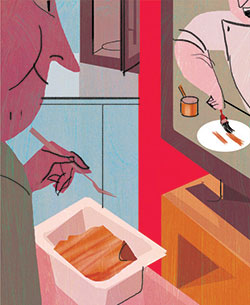Food on TV

Roula Khalaf, Editor of the FT, selects her favourite stories in this weekly newsletter.
I recently sat, traffic-jammed in a cab, and the conversation with the driver turned to food. “I’m a proper foodie,” he said, much as he might have asserted that he was a sports fan. This was encouraging. “Oh yes,” he went on, “I love all sorts of food … all the chefs.” I asked him what his favourite things to cook were and his favourite restaurant. There was a short silence – not so much embarrassed as uncomprehending – and he said, “No, I don’t cook, and restaurants make me feel uncomfortable – but I watch all the shows on the telly.”
It was sobering. Obsessively watching food TV without cooking or eating anything that’s featured is, it seems, the working definition of a “foodie” in the UK now. In the same way that most self-professed “sports fans” will never put hand or foot to a ball, food has become unsullied by actual involvement.
From the morning after the last episode of The Great British Bake Off, publishers sat by their inboxes waiting for the finalists’ book proposals. The resultant bidding wars will be important. Food is one of the few healthy sectors in publishing. Being selected to be sold by the supermarkets hugely boosts sales and selection is invariably dependent on a healthy TV profile.
So powerful is TV in supporting a book’s sales that advances to new writers are now routinely linked to having a series set up. A modest lump for writing the book and a socking great bonus if one is lucky enough to land a show.
Some TV entities are even larger “gorillas in the room”. People with years of experience in the restaurant business have trouble raising finance to strike out alone while several MasterChef finalists have been able to attract backing. It may seem counterintuitive to invest in someone who is, by definition, an inexperienced cook but it’s not by any means a foolish strategy. The kind of exposure that comes with a charismatic young “chef” who’s been a fixture on every foodie’s screen for three months is priceless.
As well as affecting who runs the restaurants, one can even argue that MasterChef infects the food that’s served. Since its inception, the format has relied on a particular type of dish: complex, photogenic, high-piled, serially faffed food that makes for those close-ups of chefs concentrating intently or jacks up the “jeopardy” by threatening to fall over. Simple, well-executed and delicious food makes lousy TV and leaves John and Gregg woefully short of script. Professional chefs have little time for theatrical fluff but MasterChef effectively defines what “a plate of food” looks like in the eyes of millions of average diners and has thus kept a kind of naff, circa 2000, submolecular plate-painting the dominant trope.
Please don’t take this as an incoherent harangue about food on TV. I occasionally appear on it myself, I’ve been involved in pitching ideas and I enjoy it as much as the next person. There’s a cheery populism to programmes such as The Hairy Bikers shows and the early series of The Great British Bake Off, and I’m not bemoaning the fact that it’s there, keeping alive an interest in food. I just think it’s time for a little more honesty. TV is no longer just “part of” a national conversation about food; it dominates it like a bore at a dinner party.
There is much in the comparison between sport and food on TV. Food celebrities are attracting the kind of money that premiership footballers command, and TV deals affect the national diet as much as they affect the national game. There is a coterie of expensive performers and an army of willing spectators, and increasingly neither has relevance to the few of us who participate, kicking about in the park or kitchen just for the joy of it.
Tim Hayward is an FT Weekend contributing writer; Twitter: @TimHayward
Comments